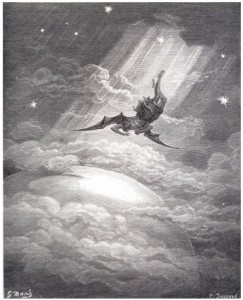Patrick Heron likely means well but zeal comes before knowledge. He invokes the end times to assert that only now God is revealing special insight on the prophetic scriptures (apparently to himself). In other words, all the great expositors and scholars of the past have unable to decode the prophecies properly, but only now God has granted special insight to a select few, including himself, to warn God’s people… Really? He argues that only now has God “unsealed” the secrets in the book of Revelation and prophetic scriptures. This betrays a serious lack of knowledge of the book in which he claims to be an authority. The book of Revelation was never sealed, it was written to the first century Christians as well as for us today:
And he said to me, “Do not seal up the words of the prophecy of this book, for the time is near.(Re 22:10)
But Patrick believes he has been granted special insight and cites,
Surely the Lord God will do nothing, but he revealeth his secret unto his servants the prophets. (Amos 3:7).
Astonishingly, he actually appears to be implying that he qualifies as such a prophet in this video at :57. I wanted to let it pass, but it seems he really means it because he cites it again at 17:30. Are we really supposed to believe that God will not do anything without letting Patrick Heron, the endtime prophet, know first? Seriously? He certainly implies as much by repeatedly citing it. But citing this verse from Amos is a major abuse of scripture. Amos was a shepherd and farmer called to prophesy during the reigns of Uzziah (792–740 BC) in the southern kingdom and Jeroboam II (793–753 BC) in the north. Amos was not giving his opinions on the interpretation of scripture; rather he spoke the very words of God directly. The Old Testament prophets were not just prognosticators rather they were spokespersons for God and covenant enforcers. This context no longer exists as we are under a new covenant and Jesus Christ is the mediator between God and man. To apply Amos 3:7 to a modern context and especially to yourself is an egregious error and extraordinarily arrogant.
His approach is very condescending as he labels the rendering in all English translations since the 16th century as a “deception.” Yes, even the authorized KJV as well as all modern translations are demonic deceptions according to Heron! The verse in question is:
“Let no man deceive you by any means: for that day shall not come, except there come a falling away first, and that man of sin be revealed, the son of perdition;(2 Th 2:3, KJV)
“Let no one deceive you in any way. For that day will not come, unless the rebellion comes first, and the man of lawlessness is revealed, the son of destruction,(2 Th 2:3, ESV)
He desperately wants to believe that apostasia means a “departure” in the sense of the “rapture” the church being gathered bodily directly preceding the Great Tribulation and the coming of the antichrist. The following observations point to the implausibility of this identification.
- The word apostasia in the Greek Old and New Testaments always refers to a “departure from faith” and never to a “catching away”, “bodily resurrection” or “gathering.”
- A negatively religious nuance of “departure” is also dictated by the context, since in 2 Thes 2:3 it is conjoined with the man of lawlessness, and in 2 Thes 2:8–12 deception and departing from the faith also appear in conjunction with “the lawless one.”
- The “gathering” of 2:1 is an allusion to Paul’s earlier teaching on the rapture of God’s people (1 Thess 4:14–17; cf. 1 Cor 15:52). Thus, Paul’s message to the Thessalonians was that they should not be misled because a sure sign of Christ’s return, the apostasy, has not yet taken place. This was Paul’s way of comforting them and reassuring them that they had not missed the Lord’s return. Patrick’s reading misses Paul’s point. We should expect to see a massive apostasy and the rise of Antichrist before the rapture.
- The coming of Christ can still be imminent like “a thief in the night.” We should allow the possibility that the two signs will take place so quickly that by the time we recognize them as such, Christ’s lightning-like coming will have been set in motion (see Mt 24:27). Even so, Paul says it should not surprise us if we are alert (1 Thes 5:4). But this can be difficult because we live in the “already/not yet” period. Accordingly, the fulfillment of the prophesied apostasy and lawless one’s coming has been inaugurated and has occurred cyclically throughout history. John wrote back in the first century, “Children, it is the last hour! As you have heard that antichrist is coming, so now many antichrists have come. From this we know that it is the last hour” (1 Jn 2:18). The last hour has been going on for 2,000 years! This explains why throughout the church’s existence many have erroneously claimed that the end has arrived. The claim is understandable, but the error lies in the inability to discern when precisely the apostasy has reached its absolute zenith and when one individual sufficiently incarnates lawlessness to the degree Paul has in mind in 2 Thes 2:4. Because of this no one can responsibly claim with absolute certainty, as Patrick does, that the end times are underway until these two signs have demonstrably occurred.
At 5:45 in the video, Patrick states that, “the answer to error is right doctrine.” This is of course true but right doctrine is derived from a sound hermeneutic which he has already abandoned at the outset with the unsealing of an open book and a gross misapplication of Amos 3:7. Of course, Patrick’s real purpose here is to promote his book and prop up the pretribulation rapture position. The word in question is apostasia. According to the Theological Dictionary of the New Testament:
ἀποστασία.
A later construction for ἀπόστασις. The word presupposes the concept ἀποστάτης “to be an apostate,” and thus signifies the state of apostasy, whereas ἀπόστασις denotes the act. Politically an ἀποστάτης is a “rebel” (Polyb., V, 41, 6; 57, 4: τοῦ βασιλέως; Diod. S., XV, 18: τῆς πατρίδος), and this sense is retained in ἀποστασία (Plut. Galb., 1 (I, 1052e): τὴν ἀπὸ Νέρωνος ἀποστασίαν; Jos. Vit., 43: διὰ τὴν ἀποστασίαν τὴν ἀπὸ Ῥωμαίων; Ap., 1, 135 f.; Ant., 13, 219.
In the LXX it also occurs in the political sense in 1 Esr. 2:23. It is particularly employed, however, in the religious sense, Jos. 22:22; Jer. 2:19; 2 Ch. 29:19 (the apostasy of Ahaz); 33:19 (of Manasseh). Cf. 1 Macc. 2:15 (used absol.); Asc. Is. 2:4. ἀποστάτης has also retained this religious sense, cf. Is. 30:1; 2 Macc. 5:8: Jason ὡς τῶν νόμων ἀποστάτης καὶ βδελυσσόμενος; Nu. 14:9; Jos. 22:16, 19: ἀποστάτης ἀπὸ τοῦ κυρίου.[1]
At 8:00, Patrick claims that Apostasia did not mean this in the Ancient Greek language. I guess someone forgot to tell the ancient Greeks that. He then cites Bullinger’s 100 year old argument concerning the construction of the term based on its roots. Interestingly, all of the translations he cited are from the 1500s! Remember Patricks assertion in the beginning of the video that only now in the end times have the prophecies been unsealed… isn’t it odd that all of his sources are over 100 years old? (Patrick repeatedly asserts that scripture cannot contradict itself but apparently its fine when he does). The problem with using antiquated scholarship is that knowledge of the ancient Greek language has increased exponentially due to academic linguistics and archeological discoveries. Hence, today’s scholars are much more authoritative on Greek grammar and etymology. What Patrick has engaged in here is a commonly known exegetical fallacy:
1. The root fallacy
One of the most enduring of errors, the root fallacy presupposes that every word actually has a meaning bound up with its shape or its components. In this view, meaning is determined by etymology; that is, by the root or roots of a word. [2]
He claims a better rendering is “the departure” and then claims that the same term is used 15 times in the New Testament and 12 out of the 15 it is used as a departure. Yet if we search by lemma, meaning the canonical or dictionary morphology, it really only appears twice. One being the verse in question and the other in Acts:
κατηχήθησαν δὲ περὶ σοῦ ὅτι ἀποστασίαν διδάσκεις ἀπὸ Μωυσέως τοὺς κατὰ τὰ ἔθνη πάντας Ἰουδαίους, λέγων μὴ περιτέμνειν αὐτοὺς τὰ τέκνα μηδὲ τοῖς ἔθεσιν περιπατεῖν.
“and they have been told about you that you teach all the Jews who are among the Gentiles to forsake Moses, telling them not to circumcise their children or walk according to our customs.(Ac 21:21)
Hear it clearly means a departure from the faith and a rebellion as well. The important thing is how did first century people use the word. To see how Paul would have understood and used it the Greek translation of the Old Testament, the Septuagint, is a great source, the term appears four times:
22 Ὁ θεὸς θεός ἐστιν κύριος, καὶ ὁ θεὸς θεὸς κύριος αὐτὸς οἶδεν, καὶ Ισραηλ αὐτὸς γνώσεται, εἰ ἐν ἀποστασίᾳ ἐπλημμελήσαμεν ἔναντι τοῦ κυρίου, μὴ ῥύσαιτο ἡμᾶς ἐν ταύτῃ, [3]
“The Mighty One, God, the Lord! The Mighty One, God, the Lord! He knows; and let Israel itself know! If it was in rebellion or in breach of faith against the Lord, do not spare us today.” (Jos 22:22)
(I will not bother to show the LXX for the rest, but I could…)
“All the utensils that King Ahaz repudiated during his reign when he was faithless, we have made ready and sanctified; see, they are in front of the altar of the Lord.”(2 Ch 29:19)
“The king’s officers who were enforcing the apostasy came to the town of Modein to make them offer sacrifice.”(1 Mac 2:15)
“Your wickedness will punish you, and your apostasies will convict you. Know and see that it is evil and bitter for you to forsake the Lord your God; the fear of me is not in you, says the Lord God of hosts.”(Je 2:19)
So Patrick is just wrong about the common usage of the word. He is engaging in another common fallacy known as “special pleading.” He is allowing his preference for the pretribulation rapture position to cloud his exegesis. I confronted him about his qualifications to dispute the unanimous (since the 16th century anyway) English rendering of the Greek in an email and he cited his Masters degree and Doctorate in Christian Literature. According to Wikipedia:
Heron holds a B.Sc. and M.A. in Business Studies from Trinity College, Dublin. He also holds a Degree in Theology and recently received an Honorary Doctorate in Christian Literature from the California Pacific School of Theology, Glendale, California, as a result of the research done in his book, The Nephilim and the Pyramid of the Apocalypse.[4]
His academic training is in business. So, in reality, he has no Greek exegesis credentials whatsoever and even his gifted doctorate is from an unaccredited institution. I would not have brought this into it, except that he brought it up as way to give himself some credibility. In truth, it does not appear that he put in the hard work to learn Greek that even a seminary trained youth pastor has. Patrick is clearly wrong in his interpretation but that does not mean that any rapture position is necessarily falsified. However, it does seem very clear that the church will see the apostasy and rise of Antichrist. This apostasy will take place within the professing church and will be a departure from the truth that God has revealed in His Word. While it is true that apostasy has characterized the church almost from its inception, Paul referred to a specific distinguishable apostasy that will come in the future (cf. 1 Tim. 4:1-3; 2 Tim. 3:1-5; 4:3-4; James 5:1-8; 2 Peter 2; 3:3-6; Jude). Do not listen to Heron for your comfort, be prepared, listen to Paul:
Let no one deceive you in any way; for that day will not come unless the rebellion comes first and the lawless one is revealed, the one destined for destruction.(2 Th 2:3)
Now the Spirit expressly says that in later times some will depart from the faith by devoting themselves to deceitful spirits and teachings of demons,(1 Ti 4:1)
But you, beloved, are not in darkness, for that day to surprise you like a thief; for you are all children of light and children of the day; we are not of the night or of darkness. So then let us not fall asleep as others do, but let us keep awake and be sober; for those who sleep sleep at night, and those who are drunk get drunk at night. But since we belong to the day, let us be sober, and put on the breastplate of faith and love, and for a helmet the hope of salvation. For God has destined us not for wrath but for obtaining salvation through our Lord Jesus Christ,” (1 Th 5:4–9)
And listen to Jesus:
Then many will fall away, and they will betray one another and hate one another. And many false prophets will arise and lead many astray. And because of the increase of lawlessness, the love of many will grow cold. But the one who endures to the end will be saved. And this good news of the kingdom will be proclaimed throughout the world, as a testimony to all the nations; and then the end will come (Mt 24:10–14)
For a more responsible handling of the rapture issue I commend the work of Chris White to you:
For an excellent scholarly treatment of the subject see: http://www.dbts.edu/journals/1998/combs.pdf
For an editorial see: http://moriel.org/MorielArchive/index.php/discernment/church-issues/end-times/one-insanity-is-but-a-reflection-of-the-other
[1] , vol. 1, Theological Dictionary of the New Testament, ed. Gerhard Kittel, Geoffrey W. Bromiley and Gerhard Friedrich, electronic ed. (Grand Rapids, MI: Eerdmans, 1964-), 513.
[2]D. A. Carson, Exegetical Fallacies, 2nd ed. (Carlisle, U.K.; Grand Rapids, Mich.: Paternoster; Baker Books, 1996), 28.
[3] Septuaginta : With Morphology, electronic ed. (Stuttgart: Deutsche Bibelgesellschaft, 1979), Jos 22:22.
[4] http://en.wikipedia.org/wiki/Patrick_Heron_%28author%29






